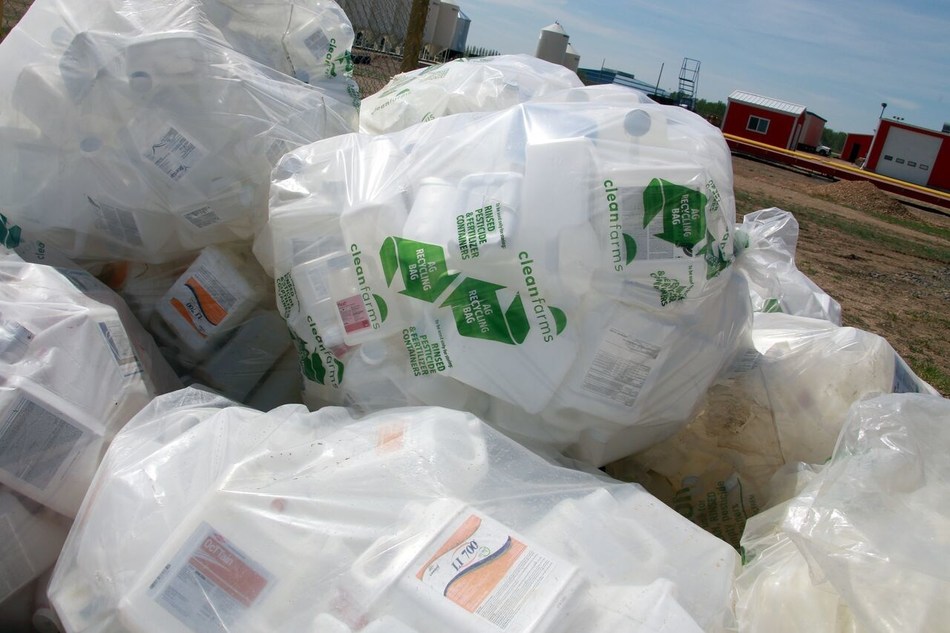- Over a decade of program operations, Cleanfarms has recovered for recycling or proper disposal 51,600 tonnes of plastic and other non-organic ag-waste from Canada’s agricultural sector. These materials consist of empty agricultural plastic jugs and containers; used grain bags; empty seed, pesticide and fertilizer bags; and old, unwanted pesticides and livestock/equine medications.
It’s an accomplishment worth celebrating says General Manager, Barry Friesen, as Cleanfarms marks its 10th anniversary in 2020 with the unveiling of an anniversary logo.
“We recognize that we have a moral obligation to farmers and other Canadians to leave our world as good or better environmentally, then when we began,” Friesen says.
About Cleanfarms
Cleanfarms is a non-profit industry stewardship organization committed to environmental responsibility through the proper management of agricultural plastic packaging and product waste. Recycled agricultural plastics are made into new products such as farm drainage tile, flexible irrigation pipe and plastic bags.
Friesen admits that with an estimated 40,000 tonnes of ag plastic generated in the agricultural sector annually, recovering it with a zero-waste mindset is a tall order, but promises Cleanfarms is “just getting started”.
For example, beginning this spring, Cleanfarms gets underway with a first-of-its-kind national scale research project that will provide critical information to help agricultural plastic producers and Canadian farmers boost their ability to recycle agricultural plastic waste.
Funded by the federal Ministry of Environment and Climate Change Canada, the first part of the study will be to quantify the types and volumes of on-farm plastic wastes and secondly, identify facilities that can manage or recycle these waste streams with the goal of creating a more circular economy for agricultural plastics.
“The work will advance our understanding of the scope of agricultural waste and drive on-the-ground solutions to help manage plastics and other waste materials to increase recycling rates and improve our ability to incorporate higher levels of recycled content in plastic products. Through this, we plan to transition agriculture as a full participant in the zero-waste circular economy. That’s one of the ways we hope to contribute to a better environment,” Friesen says.
A top ag-waste contender for recycling are empty pesticide and fertilizer jugs. As most pesticides and fertilizers are purchased in the spring, that’s when growers find themselves with dozens of empty jugs and containers. The annual recovery rate for empty jugs stands at an average of 65% compared to the number of jugs Canadian farmers use every year, but Cleanfarms wants 100% of them back for recycling.
“Sixty-five percent is good, but it still leaves lots of ag-plastic jugs that are not finding their way back to the recycling collection system every year. Why? We know farmers want sustainable farm operations. So, we are doing everything we can to work with our partners in ag-retail and municipalities to improve convenience and collection. Now we need more farmers to work with us to get everyone of those containers back,” Friesen says.
By the end of 2018, the organization had recovered:
– 45,722 tonnes of empty plastic jugs and containers
– 1,400 tonnes of used grain bags, film and twine
– 1,300 tonnes of old seed, pesticide and fertilizer bags
– 3,242 tonnes of unwanted pesticides and livestock medications
Cleanfarms’ mandate is to support agriculture to be both responsible and sustainable in all operations. As a non-profit stewardship organization funded by industry, its vision is to ensure all materials used for food production and animal management achieve the ultimate goal of zero waste.
“Some countries like Germany, France and Brazil have made tremendous strides toward zero waste in agriculture. Cleanfarms believes Canada is a global frontrunner and the same is possible in the next 10 years in Canada,” Friesen says.
SOURCE CleanFARMS Inc.


